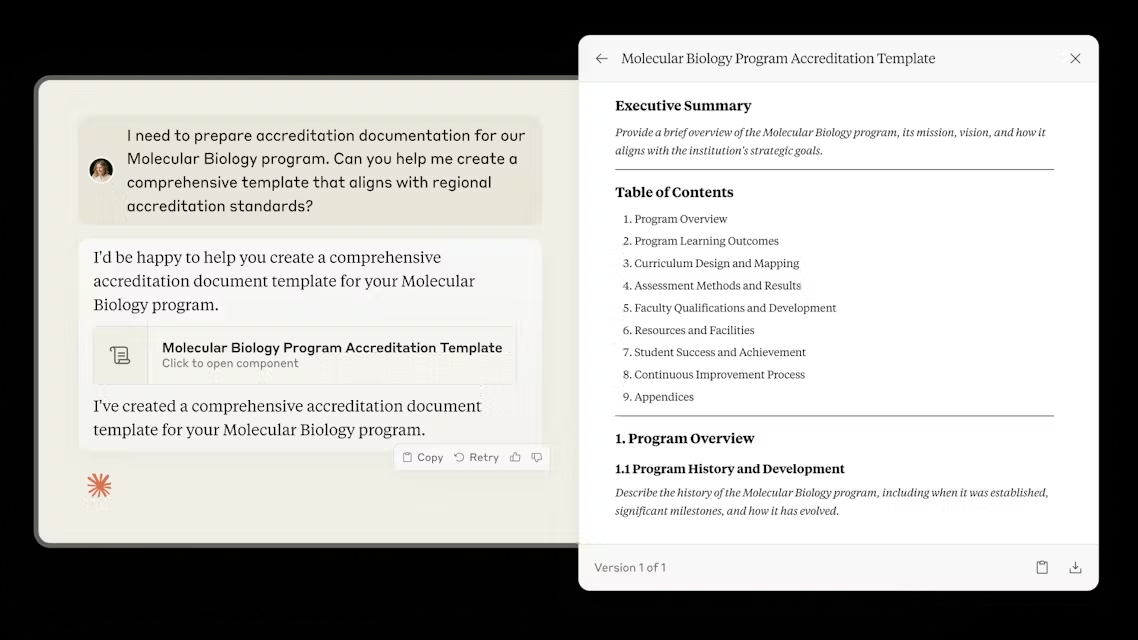Anthropic Launches Claude for Education, an AI-Assisted Approach to Guided Learning
artificial intelligence (AI) company Anthropic Recently announced the launch of Claude for EducationThis is a customized product for higher education institutions. Claude Version. On the wave of the global education community actively exploring the convergence of artificial intelligenceAnthropic This move is not only an expansion of the technology's application, but also reflects its intention to guide AI into a more thoughtful role in education, aiming to engage educators and students in shaping AI's role in society.

Anthropic This time around Claude for Education Several key initiatives were released:
- Learning mode: a new
ClaudeInteractive experiences, which emphasize guided reasoning processes rather than directly providing answers, are intended to foster critical thinking. - Campus wide deployment: with the United States
Northeastern UniversityUnited KingdomLondon School of Economics and Political Science(LSE) and the United StatesChamplain CollegeAgreement on campus-wide access. - Academic Eco-Cooperation: Join
Internet2Alliance, and with education technology companiesInstructurepartnership that plans to embed AI capabilities into widely usedCanvas LMSLearning Management System. - Student Empowerment Program: Launch
ClaudeCampus Ambassador program, and for the use ofClaudeAPIProvide line support for student projects that undergo development.
AI on campus: from tool to partner?
Claude for Education Commitment to safe, reliable AI services for colleges and universities. According to Anthropic envisioned with a wide range of application scenarios:
- schoolchildrenIt can be used to draft a literature review with canonical citations, solve calculus puzzles with step-by-step instructions, or get feedback on an argument before submitting a paper.
- principalsThe ability to create grading rubrics based on specific learning objectives, efficiently provide personalized feedback on student papers, and even generate chemical equations of varying difficulty.
- administrative staffIt can be used to analyze enrollment trends across departments, automate repetitive email responses to common inquiries, and translate lengthy policy documents into easy-to-understand
FAQFormat.
These scenarios depict the potential for AI to move from a simple information retrieval tool to a "partner" role that more deeply integrates with teaching and administrative processes. At its core, it provides a familiar chat interface with enterprise-grade security and privacy controls.
Core differences: exploration of "learning models"
Claude for Education One of the highlights is the introduction of the Learning Model. The model was introduced in Projects features (allowing students to organize around specific assignments or topics with the Claude The Learning Mode is designed to work within the context of a dialog (a conversation between the student and the AI). Unlike traditional AI, which tends to give direct answers, Learning Mode attempts to promote independent thinking by:
- Leads rather than answersFor example, ask the question, "How would you go about solving this problem?" Instead of giving a direct solution.
- Socratic questioning:: Lead students to deepen their understanding through questions such as "What evidence supports your conclusions?" Questions such as "What evidence supports your conclusion?" lead students to deepen their understanding.
- Emphasis on core concepts: Highlight the rationale behind specific issues.
- Provide practical templates: Structured formatting advice for research papers, study guides and outlines.
This design reflects the Anthropic Trying to position AI as a tool to assist thinking and inspire thinking, rather than a simple "answer machine". This is undoubtedly a positive exploration of the current application of AI in education. However, whether this kind of guided interaction can truly and effectively cultivate critical thinking in all students, and how to play the best effect in different disciplines and teaching scenarios, still need to be tested in practice and further observation.
Empowering Students, Building Ecologies
In addition to the core product.Anthropic Two programs for students have also been launched:
ClaudeCampus Ambassador: Give students the opportunity to work directly withAnthropicTeams collaborate to promote education-related AI activities on their campuses.- Student Developer Support: for the use of
ClaudeAPIStudents who build programs offer applicationsAPIAmount of funding opportunities.
These initiatives demonstrate Anthropic Focusing not only on collaboration at the institutional level, but also on fostering a community of student users and stimulating innovative applications based on their technology is essential to building an active Claude The ecology of education is crucial.
Anchoring colleges and universities: diversified strategic partnerships
Anthropic The first partnerships with three distinctive colleges and universities were announced:
Northeastern University: asAnthropicThe first university design partner for the company, which covers 50,000 students, faculty and staff at 13 campuses around the world.NortheasternThe university has a long history of integrating AI with education, and its president, Joseph E. Aoun, is a thought leader in the field. Together, the two companies will explore best practices for AI in higher education, develop new AI education tools, and create a framework for responsible AI deployment. The scale and depth of this collaboration signals a desire to set a benchmark for the industry.London School of Economics and Political Science(LSE): As the world's leading social science research institution.LSEWill be rolled out to all studentsClaudeTheLSEEmphasizing that by working withAnthropicCollaborate to ensure that students have equitable access to AI tools and skills for an AI-transformed world and to explore how AI can be deployed responsibly in educational contexts.This reflects the social science field's unique perspective on understanding and shaping the societal impact of AI.Champlain College: This career-oriented college will deploy campus-wideClaudethat is designed to help students acquire the AI skills necessary for the future workplace. By combiningClaudeinto on-campus and online programs.Champlain Collegewill explore the impact of AI on workforce development, specifically those human skills that will set graduates apart in a technology-driven era.
The selection of these three different types of colleges and universities, each with their own unique characteristics, shows the Anthropic The strategy seeks to validate and optimize its products in different educational scenarios, covering research universities, institutions in specialized fields and vocational education institutions.
Getting through the channels: key industry joins forces
In order for Claude smoother integration into the technical facilities and workflows available at the university.Anthropic Collaborations with key industry organizations were also announced:
Internet2: This is a non-profit organization that provides high-speed secure networks, cloud solutions and identity management tools for research and education. JoinInternet2furthermore, seekNET+Service assessment, meaningAnthropicIt is hoped that this trusted channel will reach a wider range of educational and research institutions, addressing the network infrastructure and trust issues in deployment.Instructure: as a mainstream learning management systemCanvas LMSdevelopers, with theInstructurecooperation is particularly critical. This meansClaudehas the potential to be embedded directly into platforms used daily by millions of students and faculty, dramatically lowering the barrier to use and improving integration. The goal of the partnership is to improve the equity and ease of integrating AI teaching tools at universities.
These two industry partnerships, particularly with Instructure of joining forces, clearly demonstrating Anthropic Not only providing AI models, but also actively opening up key channels into the education market, aiming to achieve scale adoption.
How to get started
right Claude for Education Colleges, universities, and educators interested in their "learning models" can learn more about them through the Anthropic official website Links provided Expressions of Intent.Anthropic Entering the field of education, especially its differentiated "learning mode", undoubtedly brings new thinking direction and practice possibility for how AI can better serve education and talent cultivation.
© Copyright notes
Article copyright AI Sharing Circle All, please do not reproduce without permission.
Related articles

No comments...




